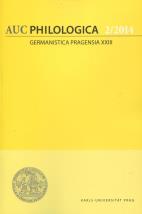Das „Reichsdeutsche“ als Prestigeträchtige Zielnorm in Prager deutschen Schriftstellerkreisen im frühen 20. Jahrhundert. Das Beispiel Franz Kafka
The Standard German used in the German Empire as a Prestigious Target Standard Language in Prague’s German Literary Circles in the Early 20th Century
Author(s): Boris BlahakSubject(s): Language and Literature Studies
Published by: Univerzita Karlova v Praze, Nakladatelství Karolinum
Summary/Abstract: The article investigates Franz Kafka’s language management during the process of writing and publishing fiction against the background of the divergence of language standards in German speaking countries around 1910. Referring to Ulrich Ammon’s concept of a social network formed by codices, language experts, standard authorities and pattern speakers/writers which defines a standard variety of language, the model character of standard German as used in the German Empire for those German 58 writers in Prague who had the ambition of publishing on an international level will be shown by Kafka as an example. By means of five regionally defined language forms belonging either to the Austrian (vergessen an + acc.) or the Prague (paar without article) standard German, representing a borderline case of Austrian standard (subjunction bis expressing anteriority) or becoming regionally antiquated (comparative particle als after adjectives in the positive form, linking morpheme -n- in the noun Einzelnheit) the article aims to make clear that Kafka felt obliged to implement corrections in his future literary German work suggested by language experts who were his friends or editorial interventions of the German publishers who published his prose writings – though not applying this to every negatively sanctioned linguistic form.
Journal: Acta Universitatis Carolinae Philologica
- Issue Year: 2014
- Issue No: 2
- Page Range: 23-58
- Page Count: 36
- Language: German

